Hot Flashes, Insomnia, Depression, Essential Oils to Relieve Menopausal Discomfort
Menopause is a significant physiological change in a woman’s life that typically occurs between the ages of 45 and 55. Unfortunately, the associated discomfort of the menopausal syndrome can last 7 to 14 years. How can women alleviate discomfort during this time? Dr. Li Jialing, director of Aroma Traditional Chinese Medicine Clinic in Taiwan and a double-certified aromatherapist by the National Association for Holistic Aromatherapy in the United States and the International Federation of Aromatherapists in the UK, recently explained on the program “Health 1+1” how aromatherapy can be used to address various discomforts during menopause. Li said, according to ancient Chinese medicine classics, menopause typically begins at the age of 49 for women and 56 for men. Men also experience menopause, but women start earlier. The primary symptoms of menopause in women include vasodilator symptoms such as hot flashes and night sweats, genitourinary problems which include sexual dysfunction and vaginal dryness, mental symptoms such as cognitive decline, mood changes, and insomnia, and physical problems such as osteoporosis, sarcopenia, cardiovascular disease, and cancer. How can these issues be addressed? Alleviate Red Flashes and Hot Flashes Menopausal women often experience the discomfort of hot flashes. They are usually a flurry of heat that doesn’t last long, but in some cases, are accompanied by night sweats and symptoms of a weak heart. According to Li, Traditional Chinese Medicine (TCM) categorizes hot flashes into five types, each caused by different factors: 1. Excess Yangming-fu organ pattern: Yangming fu-organ syndrome involves internal accumulation, leading to abdominal pain and distension with constipation—fire and heat cause the bodily fluids to overflow, making the patient sweat. Hot flashes occur between 3 p.m. and 5 p.m. and are often accompanied by constipation. 2. Yin and blood deficiency: Related to hormonal and endocrine changes. These hot flashes usually occur in the afternoon or at night and are felt in the palms, feet, and chest. 3. Spleen and stomach qi deficiency: Hot flashes occur in the morning and subside in the afternoon, or they may occur in the afternoon when one feels so tired that she does not want to talk. 4. Qi consumed by summer heat: Hot flashes occur when it is hot in the morning and cool in the evening, accompanied by irritability and fatigue. 5. Internal blood stasis: Hot flashes occurs in the afternoon or at night and are accompanied by thirst. The tongue and face may also appear dark and stagnant. (Shutterstock) Li recommended pressing two acupuncture points to alleviate hot flashes: the Daling (PC 7) on the pericardium meridian and the Taichong (LR 3) on the liver meridian. In addition, she suggested consuming collagen-rich and heat-clearing foods such as peach gum, white fungus, black fungus, sweet potato leaves, okra, sea cucumber, and bird’s nest*. According to TCM, meridians are the pathways through which energy flows in the human body, facilitating the transportation of “qi” (vital energy) and blood throughout the body. These substances form the foundation of the human body and sustain its vital activities. The human body has 12 major meridians, each corresponding to an internal organ. These organs are connected to the surface of the body through the meridians. Acupuncture points are special points located on the meridians, and by stimulating these points through acupuncture or medical massage, it is believed that corresponding internal organ diseases can be treated. (The Epoch Times) (The Epoch Times) Eliminate Heart Palpitations Many women going through menopause may experience sudden heart palpitations, which can be difficult to distinguish from a heart problem. Li advises getting an ECG test to rule out any heart issues. In TCM, palpitations are classified into three types: 1. Heart qi deficiency: TCM believes that “sweat is the fluid of the heart,” and menopausal hot flashes and night sweats increase the burden on the heart, leading to heart qi deficiency and palpitations. Treatment involves replenishing qi and strengthening the heart. 2. Heart, spleen, and blood deficiency: Irregular meals and an unbalanced diet may cause gastrointestinal tract problems. Also, excessive thinking may affect digestive function, as TCM believes “thinking hurts the spleen.” Poor digestion can lead to poor blood production and insufficient blood supply to the heart. When a woman is prone to palpitations after eating, it is likely related to digestive problems. 3. Disharmony between heart and kidney: The heart and kidney are considered as fire and water, respectively. When the kidney water is insufficient, the heart fire will flourish, leading to palpitations. Balancing the heart and kidney is an effective approach to alleviating palpitations. The theory of yin and yang in the basic theory of Chinese medicine holds that there are two corresponding characteris

Menopause is a significant physiological change in a woman’s life that typically occurs between the ages of 45 and 55. Unfortunately, the associated discomfort of the menopausal syndrome can last 7 to 14 years. How can women alleviate discomfort during this time?
Dr. Li Jialing, director of Aroma Traditional Chinese Medicine Clinic in Taiwan and a double-certified aromatherapist by the National Association for Holistic Aromatherapy in the United States and the International Federation of Aromatherapists in the UK, recently explained on the program “Health 1+1” how aromatherapy can be used to address various discomforts during menopause.
Li said, according to ancient Chinese medicine classics, menopause typically begins at the age of 49 for women and 56 for men. Men also experience menopause, but women start earlier.
The primary symptoms of menopause in women include vasodilator symptoms such as hot flashes and night sweats, genitourinary problems which include sexual dysfunction and vaginal dryness, mental symptoms such as cognitive decline, mood changes, and insomnia, and physical problems such as osteoporosis, sarcopenia, cardiovascular disease, and cancer. How can these issues be addressed?
Alleviate Red Flashes and Hot Flashes
Menopausal women often experience the discomfort of hot flashes. They are usually a flurry of heat that doesn’t last long, but in some cases, are accompanied by night sweats and symptoms of a weak heart.
According to Li, Traditional Chinese Medicine (TCM) categorizes hot flashes into five types, each caused by different factors:
1. Excess Yangming-fu organ pattern: Yangming fu-organ syndrome involves internal accumulation, leading to abdominal pain and distension with constipation—fire and heat cause the bodily fluids to overflow, making the patient sweat. Hot flashes occur between 3 p.m. and 5 p.m. and are often accompanied by constipation.
2. Yin and blood deficiency: Related to hormonal and endocrine changes. These hot flashes usually occur in the afternoon or at night and are felt in the palms, feet, and chest.
3. Spleen and stomach qi deficiency: Hot flashes occur in the morning and subside in the afternoon, or they may occur in the afternoon when one feels so tired that she does not want to talk.
4. Qi consumed by summer heat: Hot flashes occur when it is hot in the morning and cool in the evening, accompanied by irritability and fatigue.
5. Internal blood stasis: Hot flashes occurs in the afternoon or at night and are accompanied by thirst. The tongue and face may also appear dark and stagnant.
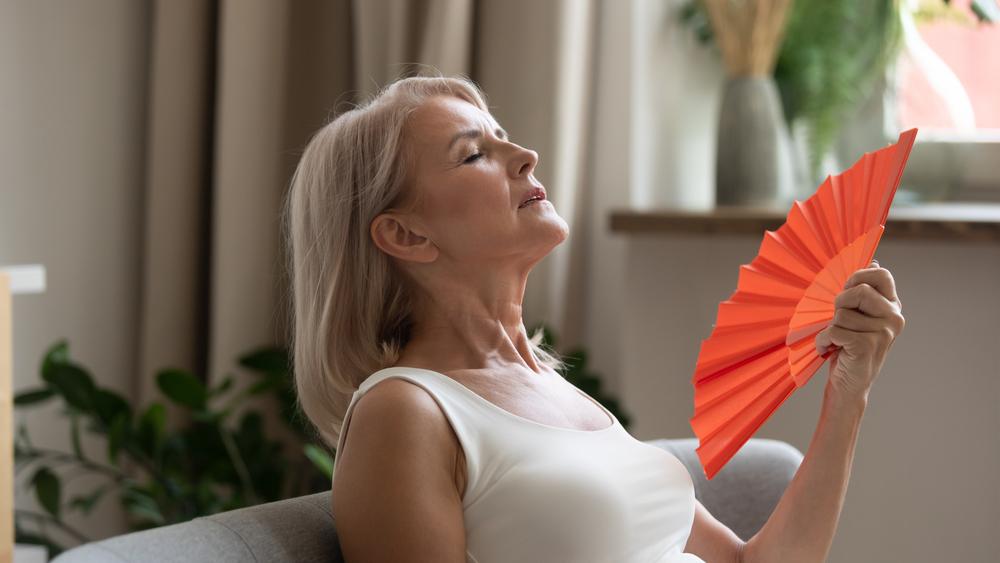
Li recommended pressing two acupuncture points to alleviate hot flashes: the Daling (PC 7) on the pericardium meridian and the Taichong (LR 3) on the liver meridian. In addition, she suggested consuming collagen-rich and heat-clearing foods such as peach gum, white fungus, black fungus, sweet potato leaves, okra, sea cucumber, and bird’s nest*.
According to TCM, meridians are the pathways through which energy flows in the human body, facilitating the transportation of “qi” (vital energy) and blood throughout the body. These substances form the foundation of the human body and sustain its vital activities.
The human body has 12 major meridians, each corresponding to an internal organ. These organs are connected to the surface of the body through the meridians. Acupuncture points are special points located on the meridians, and by stimulating these points through acupuncture or medical massage, it is believed that corresponding internal organ diseases can be treated.
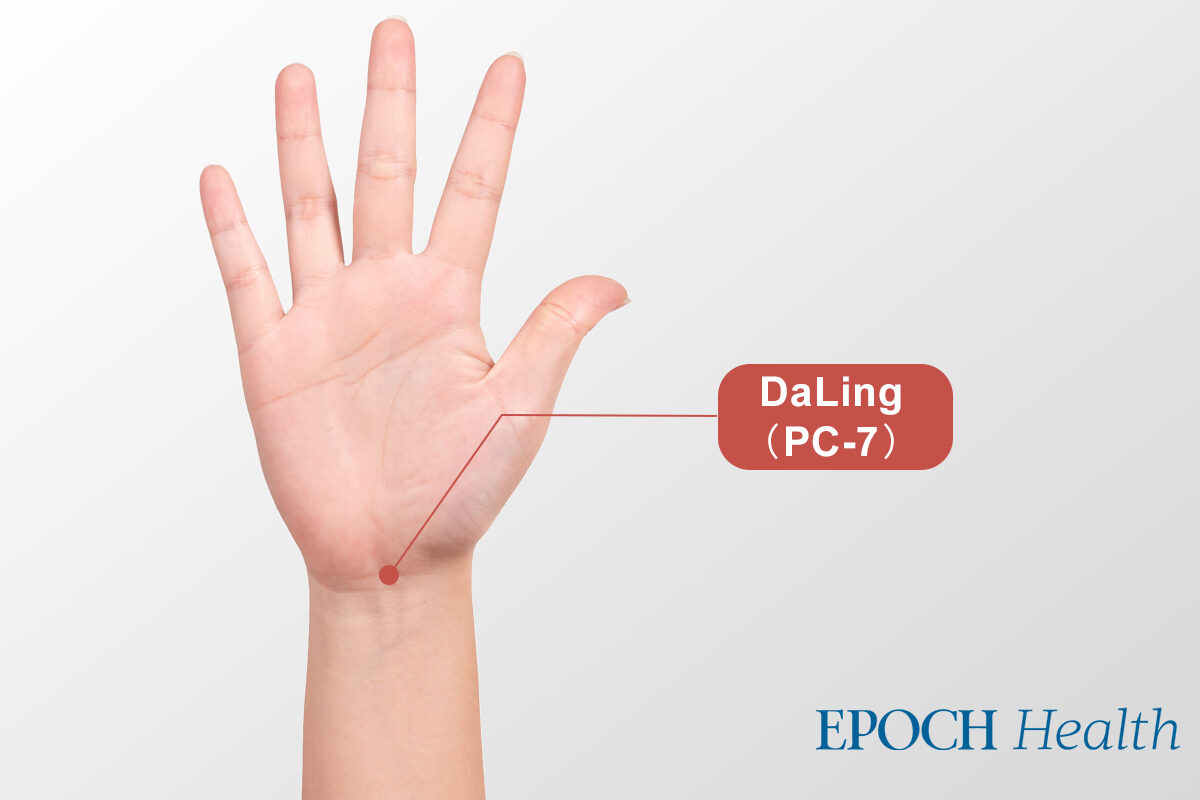
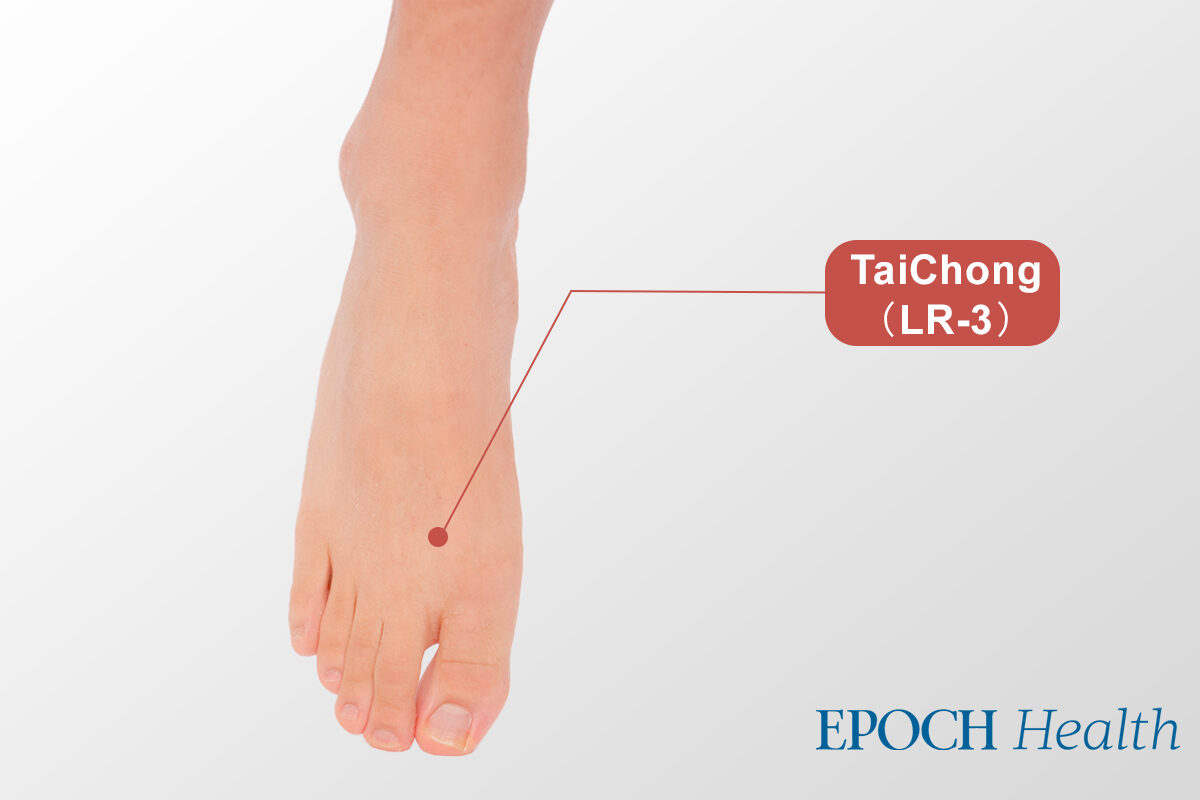
Eliminate Heart Palpitations
Many women going through menopause may experience sudden heart palpitations, which can be difficult to distinguish from a heart problem. Li advises getting an ECG test to rule out any heart issues.
In TCM, palpitations are classified into three types:
1. Heart qi deficiency: TCM believes that “sweat is the fluid of the heart,” and menopausal hot flashes and night sweats increase the burden on the heart, leading to heart qi deficiency and palpitations. Treatment involves replenishing qi and strengthening the heart.
2. Heart, spleen, and blood deficiency: Irregular meals and an unbalanced diet may cause gastrointestinal tract problems. Also, excessive thinking may affect digestive function, as TCM believes “thinking hurts the spleen.” Poor digestion can lead to poor blood production and insufficient blood supply to the heart. When a woman is prone to palpitations after eating, it is likely related to digestive problems.
3. Disharmony between heart and kidney: The heart and kidney are considered as fire and water, respectively. When the kidney water is insufficient, the heart fire will flourish, leading to palpitations. Balancing the heart and kidney is an effective approach to alleviating palpitations.
The theory of yin and yang in the basic theory of Chinese medicine holds that there are two corresponding characteristics of yin and yang in all things or phenomena in nature. For example, there is earth and sky, and heat and cold. Yin and yang are opposing energies, but they are interdependent and indispensable to each other. When yin and yang are in balance, people will be healthy and energetic, and life will be more harmonized and stable.
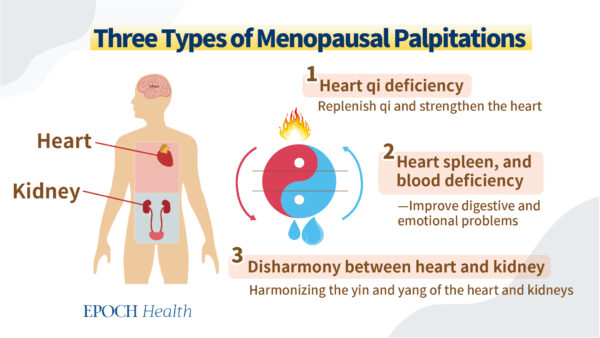
Reinforcing the Bones
Osteoporosis is a major concern for menopausal women, as it can lead to fractures in the vertebrae, femur, and wrist bones. Symptoms such as “sore bones” and “shrinkage” can indicate the presence of osteoporosis.
Li recommends consuming more calcium-rich foods to reduce bone loss. Animal-based calcium sources include milk, yogurt, cheese, shrimp, dried small fish, sardines, and oysters. Plant-based sources include tofu, soy milk, miso, sea sedge, seaweed, nori, shiitake mushrooms, and black sesame. To aid calcium absorption, it is best to avoid coffee and alcohol and to spend more time in the sun to synthesize vitamin D3.
Essential Oils Can Relieve Menopausal Discomfort
A study published in Complementary Therapies in Medicine in 2021 showed that lavender essential oil effectively improved sleep and menopausal symptoms in postmenopausal women with insomnia. The study was a double-blind, randomized, controlled trial in which the test and control groups inhaled Lavandula angustifolia essential oil and sunflower oil, respectively, for 29 days.
The study found that those who inhaled lavender essential oil had a significant reduction in time spent asleep, depression, hot flashes, and postmenopausal symptoms, an improvement in wake after sleep onset, and an increase in sleep efficiency as shown in polysomnographic data.
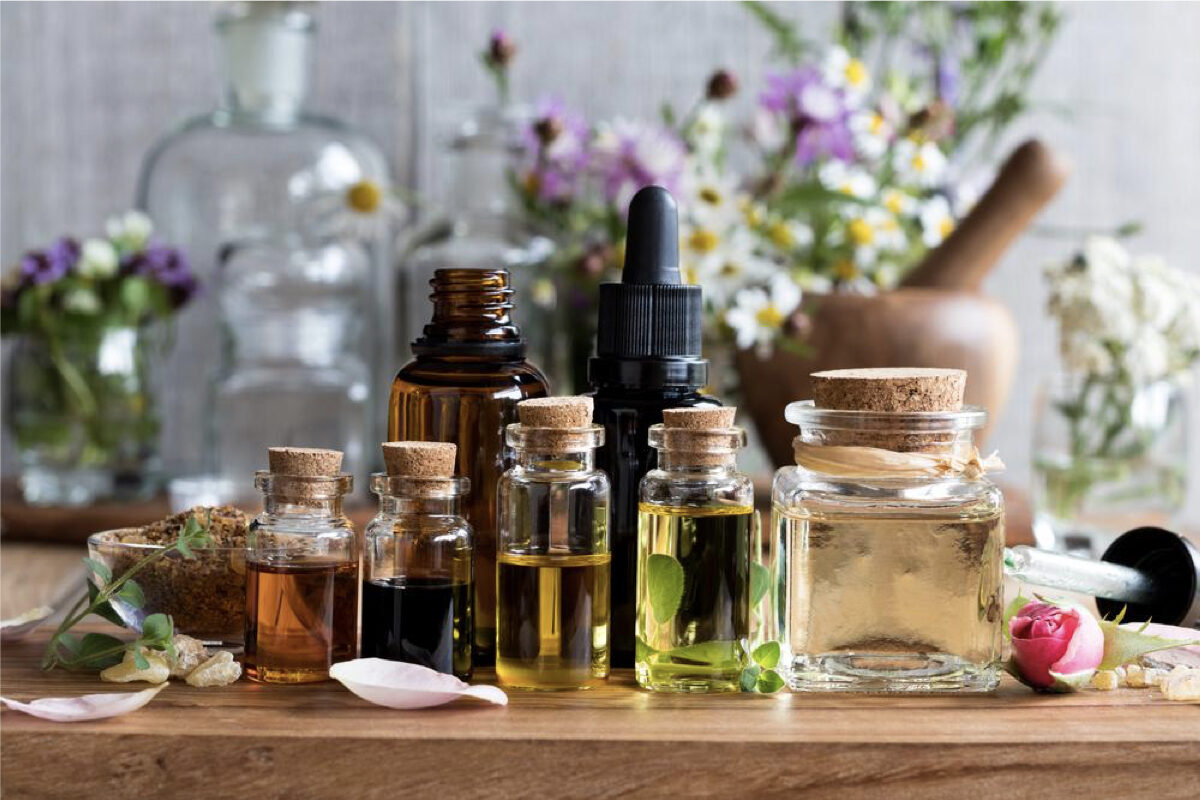
Li suggests that to adjust the autonomic nerve, nourish the liver, and relieve depression, one can use essential oils such as lemon, rose, bergamot, and salvia. To nourish the liver and the kidney, use rose geranium, lavender, Roman chamomile, sage, neroli, chaste tree, European red pine, and European fir.
Li also provides several aromatherapy formulas with essential oils to alleviate menopausal symptoms:
1. To soothe the liver and nourish the kidneys: Mix 2 drops of bergamot, 2 drops of rose geranium, 1 drop of lavender, 1 drop of sage, 1 drop of rosewood, 1 drop of permanent flower (Helichrysum), and 2 drops of European red pine into 10ml of sweet almond oil. Apply the mixture to the body.
2. To fight Candida albicans: Add 2 drops of rose geranium, 1 drop of thyme linalool, 1 drop of green flower white millia, and 1 drop of lavender in warm water to a small amount of body wash. Then, sit in the bath for 10 minutes.
3. Relieve vaginal dryness: Mix 2 drops of Indian jasmine and 3 drops of lemon with 10 ml of sweet almond oil. With clean hands, apply to the vaginal mucosa.
*Some of the herbs mentioned in this article may be unfamiliar, but they are generally available in Asian supermarkets.
Note: Because different people have different physiques, it is recommended to consult your doctor or TCM experts.







